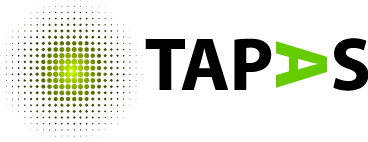TAPAS Final Workshop
New insights and results from the European TAPAS training network
Place:
Campus Drie Eiken | University of Antwerp
The full Broadcast of the workshop (19 recordings) can be found here
The broadcast can also be found on the TAPAS Youtube channel
Program
Thursday, September 8th, 2022 – 9.00 am* to 4.30 pm
University of Antwerp, Campus Drie Eiken, Building Q
Campus Drie Eiken | University of Antwerp
* Welcome with coffee from 8.30 am
Morning session (9:00 am - 12:15 pm)
9:00 - 9:15 Dr. Mathew Magimai Doss (Idiap Research Institute) - Overview of TAPAS project
9:15 - 9:45 Juan Camillo Vasquez (Friedrich-Alexander-Universität Erlangen-Nürnberg) - Towards the assessment of patients with neurological disorders using mobile devices. The experience from Apkinson (online)
10:00 - 11:00 Pathological speech assessment and treatment – part I
Thomas Rolland, (INESC ID) - Pronunciation software tool with gamification elements for children
Tomas Arias (Ludwig-Maximilians-Universität München) - Assessment of speech production in Cochlear implant patients (online)
Abdessalem Hammami (imec / Ghent University) - Efficacy of phonological error detection in speech therapy
11:15 - 12:15 Pathological speech assessment and treatment – part II
Dr. Timothy Pommée (Université Paul Sabatier) - Acoustic analysis of speech dimensions in pathological speech
Xue Wei (Radboud Universiteit Nijmegen) - Automatic distance scores for measuring speech intelligibility
Sebastiao Quintas (IRIT Institut de Recherche en Informatique de Toulouse) - Measuring intelligibility in head and neck cancer patients
Afternoon session (14:00 - 16:15 pm)
14:00 - 15:00 Speech signal-based applications for specific health conditions
Dr. Yilin Pan (University Of Sheffield) - Detecting cognitive decline related to dementia (online)
Nallanthigal Venkata Srikanth (Philips Research Eindhoven) - What speech signals can teach us about respiratory conditions (online)
Bence Mark Halpern (The Netherlands Cancer Institute - Antoni van Leeuwenhoek) - Predicting and synthesising plausible speech examples after oral cancer treatment
15:15 - 16:15 Speech technologies for pathological speech processing
Viviana Mendoza (Antwerp University Hospital) - A new virtual Articulation Therapist (online)
Zhengjun Yue (University Of Sheffield) and Enno Hermann (Idiap Research Institute) - Advances in dysarthric speech recognition
Zhao Ren (University of Augsburg) and Julian Fritsch (Idiap Research Institute) - Learning representations for pathological speech processing
Friday September 9th
TAPAS – future perspectives in speech technology based health applications
Morning Session (8:30 am – 12:00 pm)
ESRs perspective (1h)
Session chair: Assoc. Prof. Julie Mauclair (Université Toulouse III-Paul Sabatier, IRIT)
8:30 – 8:40 Tomas Arias (Ludwig-Maximilians-Universität München) - Speech technology for analysis of speech production in Cochlear Implant users (online)
8:40 – 8:50 Zhengjun Yue (The University Of Sheffield) - Further perspectives on pathological speech recognition
8:50 – 9:00 Wei Xue (Radboud Universiteit Nijmegen) - Future perspectives on speech intelligibility in practice
9:00 – 9:10 Zhao Ren (University of Augsburg) - Future perspective of computer audition in healthcare
9:10 – 9:20 Juan Camillo Vasquez (Friedrich-Alexander-Universität Erlangen-Nürnberg) - New research questions for the speech assessment of patients with Parkinson’s disease (online)
9:30 – 9:45: Coffee break
Clinical perspective (1h)
Session chair: Prof. Dr. Gwen van Nuffelen (Antwerp University Hospital)
9:45 – 9:55 Prof. Dr. Gwen van Nuffelen (Antwerp University Hospital) - Future perspectives on assessment and treatment of motor speech disorders
9:55 – 10:05 Prof. Dr. med. Maria Schuster (MMC Nürnberg) - Caring for persons with hearing impairment: new methods for speech evaluation and rehabilitation (online)
10:05 – 10:15 Assoc. Prof. Virginie Woisard (Centre Hospitalier Universitaire de Toulouse) - Automatic assessment of speech disorders in oral and oropharyngeal cancer: future perspectives”. (online)
10:15 – 10:25 Univ.-Prof. DDr. Kurt Schicho (Medical University of Vienna) - Does lip augmentation using hyaluronic acid filler interfere with speech intelligibility?
10:25 – 10:35 Dr. Rob van Son (The Netherlands Cancer Institute - Antoni van Leeuwenhoek) - Multidimensional speech assessment, the NKI-AVL experience
10:35 – 10:45 Dr. Daniel Blackburn (The University of Sheffield) - Challenges in developing an automated assessment of cognition based on language in ethnic minority groups (online)
10:45 – 11:00: Coffee break
Technology perspective (1h)
Session chair: Dr. Mathew Magimai Doss (Idiap Research Institute)
11:00 - 11:10 Prof. Juan Rafael Orozco Arroyave (University of Antioquia) - Multimodal evaluation of Parkinson’s disease: current and future perspectives (online)
11:10 – 11:20 Dr. Heidi Christensen (The University of Sheffield) - Automatic assessment of cognitive impairment: current and future perspectives
11:20 – 11:30 Dr. Aki Härmä (Philips Research Eindhoven) - Speech as a sensing modality in remote patient monitoring and diagnostics
11:30 – 11:40 Oscar Forth and Tom Coy (Oxford Wave Research) - Transfer learning with TAPAS: from health to identity
11:40 – 11:50 Prof. Dr. Felix Burkhardt (audEERING) - Aspects of detecting Covid from voice: a practical approach (online)
11:50 – 12:00 Dr. Alexander Wolff von Gudenberg (Institut der Kasseler Stottertherapie) - The hybrid Kasseler stuttering therapy goes international with its own platform “freach” (online)
12:00 – 12:10 Mr. Swapnil Gadgil (Therapy Box Limited) - Therapy Box’s speech screening apps: TAPAS project contributions & future scope
Lunch break
Afternoon Session (2:00 - 3:30 pm)
Panel discussion to merge perspectives from morning sessions
Moderators: Assoc. Prof. Julie Mauclair, Prof. Dr. Gwen van Nuffelen and Assoc. Prof. Alberto Abad, INESC ID
